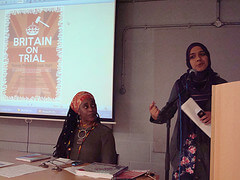 (Gloria Dawson came along to our Britain on Trial event, organised as part of the ESRC Festival of Social Science. Here she writes about her experiences of the day. You can follow Gloria on twitter @g_dawson)
(Gloria Dawson came along to our Britain on Trial event, organised as part of the ESRC Festival of Social Science. Here she writes about her experiences of the day. You can follow Gloria on twitter @g_dawson)
I was really excited to go along to ‘Britain on Trial,’ partly because I didn’t know what to expect or how it was going to work. I wasn’t able to stay for the whole day, but these are my impressions of what I did take part in!
After some delicious food and a chat with some of the other participants, we were taken on a whistle-stop tour of some of the injustices and inequalities that some of us in Britain today both suffer and perpetuate. I’ve never seen such a variety of speakers take to the stage so rapidly to share their thoughts on race, class, power and gender in the UK; from academics to performance poets. And we moved, sometimes perhaps with too much speed, from slavery to advertising to sexism to institutional racism to immigrant labour. The whole day was a bit of an experiment, and certainly rough around the edges. There was such a variety of people in the room, with differing levels of interest and knowledge, that inevitably some of what the speakers had to say was not new to some of us. But the variety of people was also a huge strength. The interjections of poetry from some of the SHAKE! Poets, and the mixture of poems, presentations and interruptions kept everyone on their toes. I particularly enjoyed Zodwa Nyoni’s Letter for Mama Oluwale, written from the perspective of a Nigerian man killed by police in Leeds in the 1969s.
It was great to hear some of the SHAKE participants linking racism with other forms of discrimination, and this carried on well into the discussion sessions; when discussing race and the police, for example, there was strong debate over whether the police could be made less racist purely by the introduction of more black and ‘majority world’ (Esther Stanford-Xosei’s ringing phrase) people into that institution. I was part of this discussion and dropped in on one on consumer capitalism, where two 13-year-olds were discussing the failures of communism. Overall, it felt like the younger participants in the day were often more incisive and open to thinking outside the political boxes we often find ourselves trapped in. I’d love to see this project working with them more and providing more spaces where their voices can be heard; not in a tokenistic way, but because what they have to say is wise, challenging and pointed.
What I valued most about the part of the day I did attend was having an opportunity to meet and talk to people I don’t normally organise or do activism with. It also made me think more about how we can think about power and oppression in history and across contexts. This is always going to be difficult and it can lead to generalisations which don’t feel useful; but it can also be productive, necessary and powerful, when channelled into poetry, into song, into political action which draws a number of people with different experiences of oppression and injustice together. ‘Britain on Trial’ reminded me again that we live in times where this is possible. Not easy, but possible.
Photo: Khadijah Ibrahiim of Leeds Young Authors and Samia Aziz of Shake!